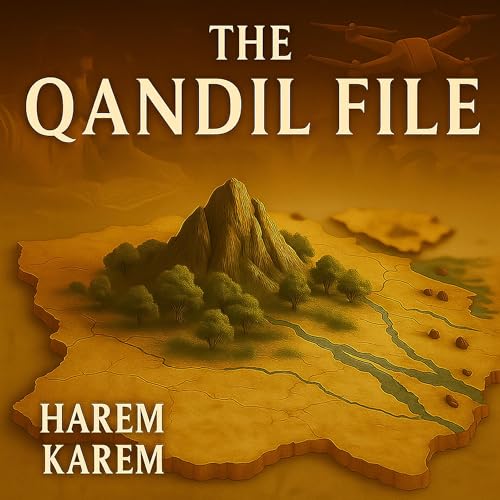
The Qandil File
カートのアイテムが多すぎます
カートに追加できませんでした。
ウィッシュリストに追加できませんでした。
ほしい物リストの削除に失敗しました。
ポッドキャストのフォローに失敗しました
ポッドキャストのフォロー解除に失敗しました
プレミアムプラン3か月
月額99円キャンペーン開催中
聴き放題対象外タイトルです。プレミアムプラン登録で、非会員価格の30%OFFで購入できます。
¥2,500 で購入
-
ナレーター:
-
Jordan Bird
-
著者:
-
Harem Karem
概要
A journalist wakes in a Qandil clinic with no name, a broken SD card in his fist, and a war for truth already in the room.
He follows fragments: a nurse who reads silence like a filea hacker who coaxes ghosts from dead drives, a psychologist who helps people remember by helping them forget, and a painter who vandalises memory with murals that won’t wash off. Each step drags him deeper into machinery that edits reality: a ministry vault, a confession-wired barbershop, a funding river called Q-FLUX hiding escape routes.
He uncovers a script, not a scoop: MIRRORLINE, a programme that manufactures heroes, leaks, and grief; a legend written around him without consent; a state that turns evidence into “cultural exchange” and gossip into surveillance minutes.
Under the mountains, in an archive funded like a museum, he finds drawers labelled with people’s lives—including his own.
Inside the deepest folder: The Qandil File—Truth in Fiction. A novelisation set to detonate where facts can’t. The country reads, laughs, rages. Power bans it, then quotes it by mistake. Fear changes sides.
You move through clinics that don’t exist on paper, safe houses “mildly inconvenient to assassinate,” the Ministry of Untruth, and the Qandil archive where every lie leaves a label.
You meet people who refuse to be footnotes: Lavan, keeping stories honest; Jina, naming folders “PROOF_OF_LIFE”; Handren, treating memory as witness; Savo and Sarko, on opposite sides of fire; Dana, the artist who tried to free the narrative.
Questions linger: Who names truth when power edits footnotes? Can story govern? When evidence fails, can fiction do the job honestly?
You leave without answers. You leave with a file that keeps writing back.
©2025 Harem Karem (P)2025 Harem Karem

